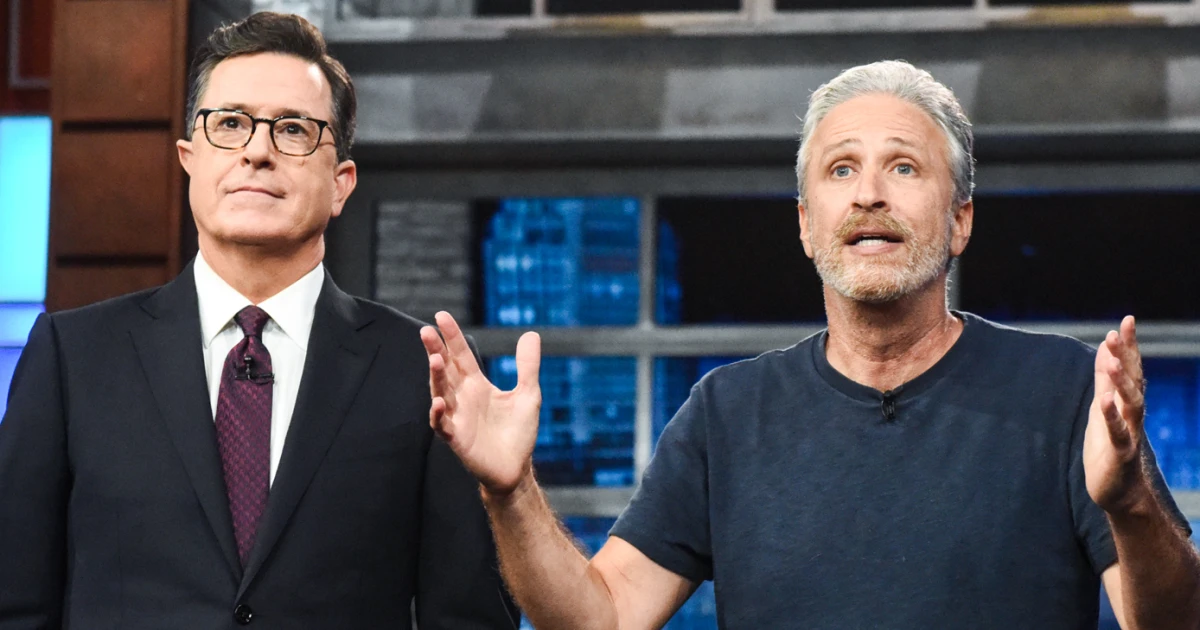Jon Stewart ended his “Daily Show” monologue last night about CBS’ recent cancellation of “The Late Show” with a suggestion for those corporations, advertisers, law firms and universities who — like CBS’ parent company, Paramount Global — “pre-comply” with President Donald Trump’s demands. Backed by a skillful gospel choir, the host sang, rapped and chanted his suggestion — which we cannot reprint in these august pages due to profanity policies. Put gently, Stewart proposed that capitulating institutions like Paramount should administer vigorous self-love to themselves.
Stewart is correct that if the cross pressures of politics and profitability are applied to talk shows — or any art form — what will result is a ‘flavorless gruel.’
With the dextrous singers in tow, Stewart made a powerful gesture on behalf of liberal America, one that grooved and felt cathartic in the present moment. Though, as rousing liberal protest gestures tend to do these days, Stewart’s song and dance had the sobering effect of immediately reminding us how powerless and vulnerable liberal America is in the present moment. After all, our host did mention that Paramount is also the parent company of the network that broadcasts the “The Daily Show.”
As for Stewart’s monologue, it tried, somewhat successfully, to puncture one popular narrative about Colbert’s cancellation. Some, like CBS, argued the decision to terminate “The Late Show” was strictly financial, given that the show was not profitable. This “bottom-line” rationale has found a home among right-wing commentators.
Stewart did not necessarily discount the financial struggles of late-night comedy. In a clever aside, he noted: “I acknowledge we’re losing money. Late-night TV is a struggling financial model. We are all basically operating a Blockbuster kiosk inside a Tower Records.”
Yet, while late-night talk shows might be likened to defunct stores selling obsolete technologies, the host made the counterpoint that CBS did little to modify, innovate and save the genre — a genre which made them huge piles of money for more than 30 years running. “When your industry is faced with changes,” Stewart intoned, “you don’t just call it a day … when CDs stopped selling they didn’t go, ‘Oh well, music, it’s been a good run.’”
Are CDs to music what late-night talk shows are to political comedy? The analogy is a bit off.
There were billions of CDs, while there are only a handful of late-night talk shows. When CDs stopped selling, music distribution moved to file sharing and streaming (which had the effect of utterly pulverizing the earning power of most musicians). If and when late-night talk shows all get deplatformed, political comedians will persevere. They will migrate back to stand-up and more aggressively toward digital media (Josh Johnson, who is hosting “The Daily Show” the rest of the week, has nearly 2 million subscribers on YouTube and is garnering massive clicks.)
Though Stewart is absolutely correct that if the cross pressures of politics and profitability are applied to talk shows — or any art form — what will result is a “flavorless gruel.” He was also correct when he bemoaned the risks of appeasing would-be kings. He accused Paramount of paying “an extortion fee” to Trump while trodding “the path of least resistance for [its] $8 billion merger.”
He urged American institutions not to follow Paramount’s example, because there’s no satiating a tyrant. “Fox spends 24 hours a day bl—g Trump and it’s not enough,” he exclaimed after reminding his viewers that Donald Trump is suing Rupert Murdoch and others for $20 billion over The Wall Street Journal’s reporting.
It was solid television, principled resistance and good gospel. Stewart flipped the bird to his corporate overlord and rinsed them with a come-and-get-me taunt. Liberal America laughed. Liberal America clapped. Liberal America gave him a standing ovation. And then liberal America wondered: Paramount would never deplatform “The Daily Show,” would it?
